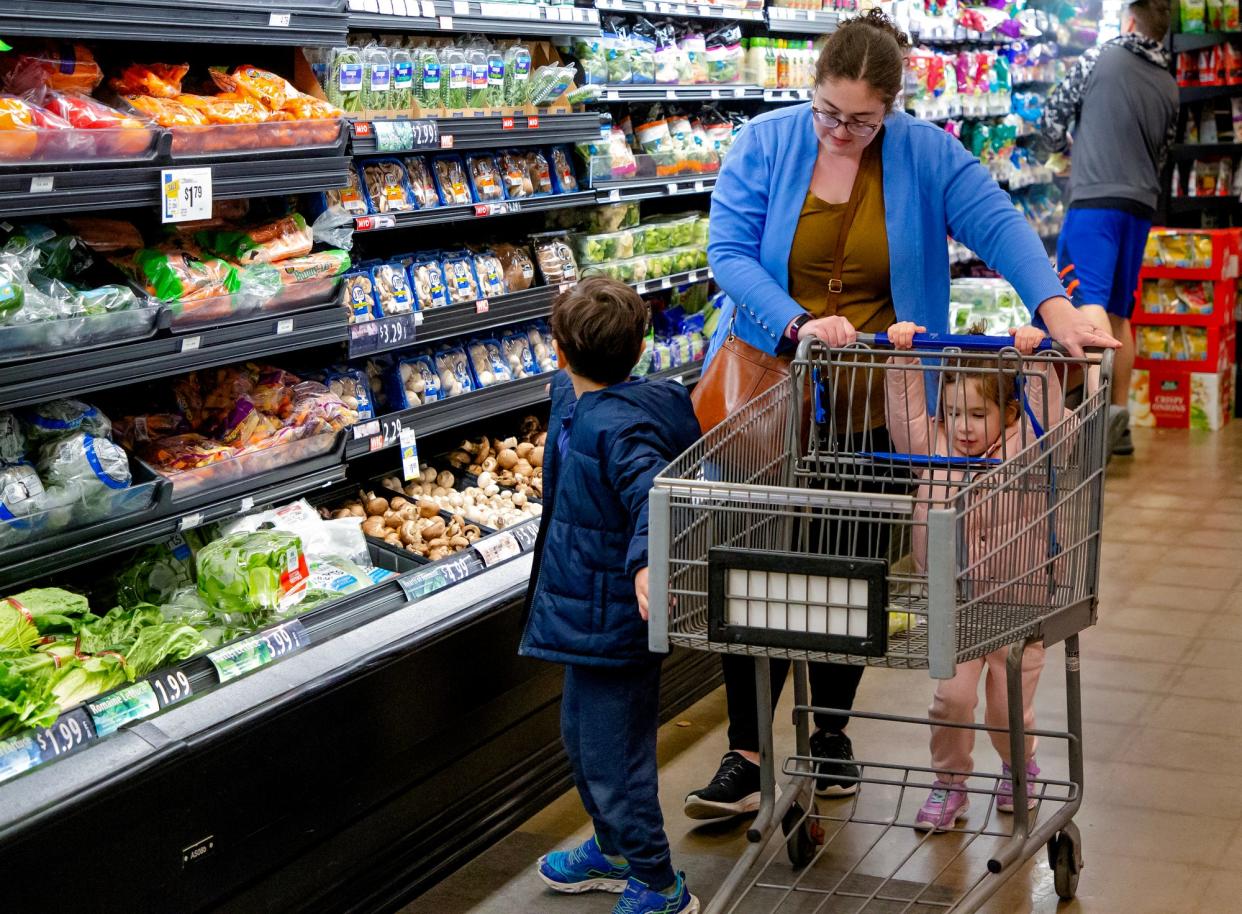Oklahoma voters support eliminating the grocery tax. But the Legislature has moved on

- Oops!Something went wrong.Please try again later.
Although bipartisan support remains at the state Capitol for eliminating the state portion of the grocery tax, movement on the issue appears to have ground to a halt.
Gov. Kevin Stitt has been one of the most vocal proponents for eliminating the state’s 4.5% sales tax on groceries, but he did not ask lawmakers to address the issue during his Oct. 3 special legislative session on tax cuts and budget transparency.
Previous efforts to eliminate the tax have stalled in the Oklahoma Legislature despite being one of the few tax issues on which Republicans and Democrats agree.
The governor still wants to eliminate the state’s portion of the grocery tax, said Stitt spokeswoman Abegail Cave.
“The grocery tax is the most regressive tax we have, and it’s important to give all Oklahomans relief in this area,” she said in a statement. “In this special session, however, Gov. Stitt is focused on fairness and transparency for all Oklahomans and hopes to get the ball rolling on a path to zero income tax as soon as possible.”
Oklahoma Legislature has shifted to talks of reducing personal income tax
When Stitt called a special session on tax cuts last summer, he asked lawmakers to eliminate the grocery tax and reduce personal income taxes. A stalemate between the House and Senate kept lawmakers from sending any tax cut bills to Stitt’s desk.
Stitt also proposed repealing the grocery tax in his executive budget this year, but lawmakers did not follow through.
More: Three things to know about taxes in Oklahoma as Gov. Stitt calls special session
Instead, the conversation has shifted to reducing personal income taxes. Legislative leaders and Stitt agree in principle about decreasing income taxes, but haven’t come to a consensus on the best path forward.
Senate President Pro Tem Greg Treat, R-Oklahoma City, introduced legislation in 2022 to eliminate the state’s grocery tax, but the bill stalled. In a Wednesday interview, Treat said he still believes the government shouldn’t tax groceries.
Oklahomans are in support of eliminating grocery tax, while some lawmakers are hesitant
Oklahoma is one of a dozen states that taxes groceries. Repealing the tax would cost the state more than $300 million annually.
While there appears to be support among average Oklahomans for eliminating the grocery tax, some GOP members of the Legislature are hesitant to do so, Treat said.
An Amber Integrated poll of 500 likely Oklahoma voters from last September found 78% of people supported eliminating the grocery tax. Roughly 65% of those surveyed supported lowering or eliminating personal income taxes.
More: Oklahoma governor's call for special session on tax fairness raises criticism, crickets
Some GOP lawmakers worried that in eliminating the state portion of the tax, the Legislature might unintentionally hinder municipalities’ ability to levy grocery taxes, Treat said. Municipalities assess grocery taxes of varying amounts on top of the 4.5% charged by the state and are heavily dependent on that revenue to fund government operations.
Some lawmakers also expressed concerns that Oklahomans would think they were being duplicitous by saying they eliminated the grocery tax when customers would still see the municipal taxes on their supermarket receipts, Treat said.
“There just wasn’t the support that I thought there’d be for grocery tax elimination,” he said.
Legislative Democrats have pushed to eliminate the tax for years, noting its regressive nature.
Grocery taxes disproportionately impact low-income earners because the tax eats up a larger portion of their income compared to high-income earners, said Emma Morris, Oklahoma Policy Institute’s health care and fiscal policy analyst.
Residents don’t pay sales taxes on groceries that are purchased with food stamps or funds from the Special Supplemental Nutrition Program for Women, Infants, and Children (WIC) — assistance programs intended to help low-income residents, Morris said.
“Theoretically, if we’re going to exempt groceries from the sales tax, we’re not really going to be providing a ton of relief to folks who really, genuinely need it,” she said. “This would be an across-the-board tax cut that, unfortunately, wouldn’t have much effect at the lowest levels of our income spectrum in Oklahoma.”
Increasing the Sales Tax Relief Credit, which offsets grocery tax costs for low-income residents, would provide more targeted and meaningful help for low-income earners, Morris said. Lawmakers should increase the rebate from $40, where it has remained since 1990, she said.
'It's a basic necessity'
House Minority Leader Cyndi Munson, D-Oklahoma City, said her caucus still supports eliminating the state’s grocery tax. Citing high inflation, she said repealing the tax would allow working families’ dollars to go further at the supermarket.
When grocery tax bills previously came up for votes in the Legislature, Munson said she heard concerns from some municipal leaders. Their fear is that if the lawmakers eliminate the state portion of the tax, then there will be a public movement for municipalities to follow suit, she said.
But on the campaign trail, Munson said she constantly was asked when lawmakers might eliminate the state portion of the grocery tax.
“Let’s think about how reliant we are on funding government … on something as basic as groceries, as food,” she said. “It’s a basic necessity.”
Oklahoma Voice is part of States Newsroom, a nonprofit news network supported by grants and a coalition of donors as a 501c(3) public charity. Oklahoma Voice maintains editorial independence. Contact Editor Janelle Stecklein for questions: info@oklahomavoice.com. Follow Oklahoma Voice on Facebook and Twitter.
This article originally appeared on Oklahoman: Oklahoma Legislature has moved on from eliminating the grocery tax

